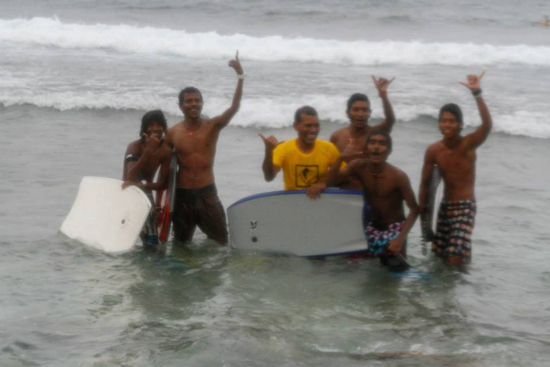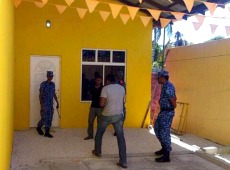Maldivian Democratic Party (MDP) presidential candidate and former President Mohamed Nasheed has dismissed allegations that his government embezzled state funds to host the 17th SAARC Summit, but acknowledged that it was possible money had been spent contrary to the Public Finance Act.
The Auditor General’s report on government expenses for the 17th SAARC Summit held in Addu City and Fuvahmulah in 2011, revealed several financial discrepancies including an overspend of more than MVR 430 million (US$27.9 million) on the event’s allocated budget.
According to the report compiled through audits of expenditure by the Ministry of Housing, the Ministry of Foreign Affairs, the President’s Office and the Maldives National Defense Force (MNDF), Nasheed’s government spent MVR 667,874,870.84 (US$ 43.3 million), on the summit – 188.82 percent more than the MVR 231,240,000 (US$14.99 million) budget passed by parliament.
Speaking during a campaign rally held at Haa Dhaal Atoll Vaikaradhoo Island yesterday (July 24), the former President welcomed the audit reports on his administration and echoed his party’s position that no corruption was involved in the spending.
“Since the ratification of the 2008 constitution, and since the beginning of word to word enforcement of laws that came after the ratification, it is quite possible that there may be certain things carried out in contrast with the public finance act. This is because senior officials of the government wanted things to get done quickly,” Nasheed said.
Discrepancies highlighted in the report included financial losses incurred by the government, violations of the Public Finance Act and Public Finance Regulation and wasteful spending.
However, the opposition MDP dismissed the findings of the report describing it as “naive” and “misguided political posturing”, while also challenging its credibility and accuracy.
“It is not possible for the MDP-led government to be involved in blatant corruption. Because we came with a plan and strategy for reforms,” said MDP’s Spokesperson Hamid Abdul Ghafoor at the time.
“Looking at perspective of development and progress, we see this report as just ‘petty accusations’. The report lacked due procedure, impartiality and transparency. It may have been possibly influenced by the political vibe in the country.”
Nasheed stressed that he had not dishonored the trust that the people had placed in him, and had not embezzled “a single laari” from the state budget.
The audit report on the SAARC Summit was released during the MDP’s campaigning ahead of the upcoming 2013 election.
Previous reports
A similar wave of audit reports were released shortly before the 2008 presidential elections, revealing the extravagant spending of then President Maumoon Abdul Gayoom – who now heads the Progressive Party of Maldives (PPM), claiming for presidency in September.
In April 2009, former Auditor General Ibrahim Naeem – the country’s first independent auditor general, who was appointed by Gayoom in January 2008 – released a damning audit report (English) of the presidential palace’s finances, revealing that over US$3 million earmarked for helping the poor was spent on “the president’s relatives, ministers and their families, senior government officials and some MPs.”
More than SGD$2.3 million (US$1,500,000) was spent on one of Gayoom’s relatives and his family on trips to Singapore throughout 2007 and SGD$ 1.4 million (US$930,000) for another relative and his family for multiple trips to Singapore.
In March 2008, SGD$23,756 (US$16,000) was spent for a minister’s grandson to stay in a hotel in Singapore for 21 days; in April, SGD$50,022 (US$33,000) was spent on medical expenses for a friend of the president; and in July 2008, SGD$6,905 (US$4,600) was spent on two pairs of glasses for a minister and his wife.
In October 2012, Dhivehi Rayyithunge Party (DRP) MP Rozaina Adam leaked invoices and bills of the spending through the social media, which revealed extravagant expenses of former President Gayoom’s family out of the former presidential palace Theemuge’s budget allocated for helping the poor.
Among the spending included, money spent on trouser materials, jewellery and expensive family stays at luxurious hotels and resorts abroad.
An invoice dated March 31, 2008 showed SG$ 14,977 spent for trouser material (polyester viscose), which was authorised and signed by former Executive Director of the Presidential Palace Ismail Faiz.
On December 20, 2006, a purple gold diamond pendant for SGD$824 and purple gold diamond bracelet for SGD$1,510 were bought using Nasreena’s credit card. Another invoice showed over SGD$28,000 paid out of the Theemuge account to the Grand Hyatt in Singapore.
Moreover, an average of MVR 5,500 (US$430) a day was spent on food for the former President and his family – equivalent to one month’s wages for an employee working in the palace at the time.
So far no action has been taken against any of the embezzlement allegations.


